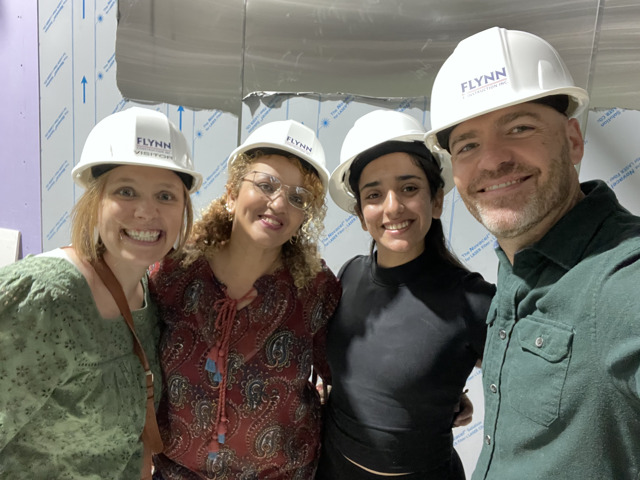This week, Covenant Presbyterian Church made a $1,000 donation to Refugee Services of Texas in honor of Shirin Keshavarz, a businesswoman and Iranian refugee who was catering Persian food to about 200 people with numerous requests for more. Armed with a solid business plan and an amazing personal story, Shirin presented her vision for how she could meet the growing demand to Covenant’s Love Letter Fund committee last spring. She was selected to be the first Love Letter Fund recipient.
This is where the story took an unexpected turn. In late April 2021, a few days before Thomas Daniel would announce Shirin as our first fund recipient, she was diagnosed with stage 4 cancer. For two months, Shirin focused on getting better. However, this woman who had defied the odds so many times lost her battle. She died on June 21.
What is the Love Letter Fund?
Through the Love Letter Fund (LLF), Covenant invests in people who want to make positive social change in Austin live out Covenant’s mission to follow Jesus where they live, work, and play.
“Our goal is to provide financial support for businesses that serve a higher purpose,” said Covenant member Ethan Burris, a professor of management at the University of Texas at Austin and chair of the committee. “We will create, incubate and support nonprofits and social ventures that meet the missional needs of Covenant and positively influence our community and the City of Austin,” Ethan explained.
The program will leverage Covenant’s wisdom, expertise and values in order to provide support for social entrepreneurs and nonprofits building products and services that benefit disadvantaged people in Austin.
Thomas Daniel summarized it this way: “Covenant will back projects, both financially and with human resources, to fan the flames of what God might want to do to make a difference in our city.”
Many in the Covenant community applied for the first round of the grants last fall. While Shirin’s business plan was further developed than the other finalists, several applicants were invited to continue to work on their ideas throughout the spring.
Food for the Heart and Soul

Shirin began preparing Persian recipes for friends and neighbors during the pandemic. In her Love Letter Fund application, she explained: “I specialize in home cooking, nothing canned, all fresh. I cook family recipes and my grandmother’s formulas that people tell me are better than they had in Iran, and that you can’t order in Persian restaurants here.”
Through word-of-mouth, more and more people began to hear about Shirin’s authentic food. In the span of nine months – with no marketing – she was preparing and selling about 200 meals two times a week. She was also giving much away.
“I always enjoy helping people,” Shirin wrote. “Every time I cook, I prepare extra for free for a lady who was pregnant, also another lady who had a surgery and a small accident. Since I came to the U.S., I also always put a day to only cook for homeless people and share between them. Every time I cook, I have a list of people I help who cannot afford it. Sharing some love!”
To meet the growing demand, Shirin needed more space. “I’m hitting the limitations,” she reported in her application. “It’s like a tree that wants to grow, but it’s hitting the roof.”
Covenant member Jen Genovesi said that when she and her husband, Steve, first heard the Covenant announcement about the Love Letter Fund, they immediately thought of Shirin. “She’s a Covenant member,” Jen said. “If anyone is putting into action what this is supposed to be, she is doing it. Through her food, she is sharing her culture, her experience, her wisdom. She’d been providing an income to other women who did part of the meals; one friend made pickles, another yogurt, and another, bread.”
Shirin didn’t think she would qualify for a loan, but Jen convinced her that it was a good opportunity for her to develop a business plan.
So Shirin, with her daughter Asal, went to work. Her vision was to run Toranj, the name of her catering business, out of an east Austin prep kitchen. Membership in this shared space would include insurance, discounted delivery rates for incoming groceries and outgoing meals to customers, marketing, mentorship and more. Shirin would make the food and deliver from there, and ultimately had dreams of moving to a food truck or even to a restaurant.
“Her work on the plan was amazing to see,” Jen said. “I knew she could cook, I knew she had a generous heart. Through this, I came to appreciate what an astute businesswoman she was.”
Shirin has an impressive resume. “I have always been a businesswoman,” she wrote in her application. “I had my own salon here and in Iran, and before that, I owned a supermarket with my ex-husband. I also worked as a sales rep for a beverage company. In six months, everyone in the Pars area in the south of Iran knew me at the shops and restaurants. I know how to run a business and make a profit. Everyone always tells me I have very good customer service.”
Asal, a personal trainer, cut her hours so she could be by her mom’s side as she started cooking. “My mother was my greatest motivation for everything,” she said. “Anything she wanted, that’s what I wanted. She knew she could count on me.” Asal did research, shopped, chopped and delivered. “I was always trying to find different ways to cut the expenses for the dishes.” Asal also researched environmentally friendly solutions to packaging and encouraged her mom to offer vegan options.
After months of preparing and delivering the food from home, the two used the knowledge they had gained to create Shirin’s presentation. They developed budgets and marketing plans; they found a space for the kitchen. And they practiced! Covenant members and others helped them throughout the process – with Zoom, by suggesting potential interview questions, and with valuable insights on doing business in America.
Shirin exhaustively did everything she could to be as prepared as possible. And it paid off.
“Shirin blew it out of the water!” said Whitney Bell, Covenant Mission Director and Love Letter Fund Committee member. “She had fleshed out her business plan and had thought of everything. She wrapped her personal story into her pitch. It was clear she had such a passion for what she did.”
Shirin told the committee that the Persian food she cooks could “feed the soul.”
“She believed she was helping people, whether they were recovering from a surgery, lacked money for food, or just missed home. She was introducing them to something that was delicious, and she wanted more people to be able to experience it,” Whitney said.
At the end of Shirin’s hour-plus presentation and Q&A, the committee members said they would “never bet against her,” Whitney said. “We wanted to give her the funds, because we knew whatever she wanted to do, she’d get done.”
Escaping Iran
“She told us we would die together, or we would survive together,” Asal said, remembering the night in 2014 when Shirin, Asal, older sister Ghazal, and younger brother Amir fled Iran. Shirin was concerned about the safety of her children; fleeing was the only way to leave, since Iranian women cannot get passports without their husbands’ permission.
Without telling anyone, Shirin’s family of four – each with a backpack—set out for Turkey. Rain and cold slowed them down in the mountains. A woman let them stay at her house. “We were all sick. My mother just opened the luggage and gave the woman our money and she told us, ‘We don’t need this money, it’s worthless now.’ The woman went and bought chicken and she cooked for us,” Asal said.
After five very stressful days made more dangerous because ISIS was monitoring the border, the family arrived in Ankara, Turkey. Shirin assumed an alias so her husband wouldn’t find her. Three years later, she was granted status as a United States refugee. During that time, she met and became engaged to a loving man.
When Shirin and her kids moved to Austin, she started working as a hairdresser, the job she did in Iran. Soon, she was diagnosed with breast cancer. It was during that time that she met Nooshi Saadatrad, who connected her to a bigger group from Covenant. “They helped us a lot,” Shirin told the committee last March. “After I shared with them about my cancer, my children and I got supported from them financially and they brought food during this time. All the help I got from Covenant made me want to be around those people. I made a big decision to be baptized.”
In September 2018, Shirin was baptized at Covenant. “Our refugee team does not focus on evangelism,” Whitney said. “Their goal is to love and care for strangers. As such, they care for refugees by welcoming them, helping them get into an apartment and connecting them to needed resources. But through the process, Shirin’s heart was captured by Jesus, and she wanted to be baptized at Covenant.”

Cancer Returns
As Shirin was working on the details of her kitchen and business, her breast cancer returned, this time late-stage. Though doctors gave her six months to live, her family and those who knew her believed she would again defy all odds. “None of us would bet against Shirin,” Whitney said.
But this time, Shirin wouldn’t get the miracle she, and her family and friends prayed for. On June 22, she died. Through an Instagram post, Asal said, “My mom was such a beautiful person. It’s amazing how much people love her. We learned to be strong from my mom, and we’re gonna stay strong. My mom will always be in my heart. She’d tell us not to cry, not to wear black and to stay happy.”
I asked Asal what she misses most about her mother, and she simply said, “her presence.”
A Shining Star
Jerry Wise, Covenant’s Contemporary Worship Director who has managed a booking agency and several cover bands, joined the LLF committee to offer his perspective as a small business owner. “I came on to do whatever I needed to do to help Shirin succeed. I’ve also helped set up and enhance the process.”
Asked to describe Shirin, Jerry paused and said: “Joyful. Driven. Passionate.”
He continued, “She had a very strong faith. She didn’t want to give up. She believed that God would make a way. Man, she was a light! She was a shining star. I’m glad that I got to know her for that short time.”
Shirin’s Family Honors Last Wishes
In Iran, it’s customary to mourn the death of a family member for 40 days. Asal asked her family still in Iran to use the money set aside for funeral expenses in the way her mother had wished – helping people in need.
The family listened. “There is a bakery in a poor neighborhood. My family told the baker to give free bread to everyone for one day. We will pay the entire amount,” Asal said.
Asal called her aunt in Iran, who – through Asal’s translations – explained that the family also gave away 20 packages filled with the equivalent of about $100 U.S. to day laborers who didn’t get jobs on that day. Another uncle gave away 100 portions of rice and chicken to those in need. And money from Shirin also helped purchase an air conditioner for a family living in the very hot south Iran.
Now, Refugee Services of Texas will use the Covenant donation toward a cookbook filled with recipes from around the world. It will be dedicated to Shirin. The final paragraph reads:
“We are so grateful to Shirin for providing nourishment and a taste of Persia for so many here in Austin during the last year of her life. And even more blessed by her life itself, providing each of us with an enduring example of resilience, courage, generosity and love.”
No one could have predicted how Shirin’s story would capture the hearts and minds of the committee and how her relentless tenacity, all the time with Asal by her side, would lead to her selection as first recipient of a Love Letter Fund grant. The legacy of this amazing woman is a great reminder of the many ways that this fund will be a source of generosity – a love letter – for our city.
This is one of Shirin’s most popular recipes
Kalam Polo Shirazi
Ingredients
For meatballs:
1 pound minced meat
1 cup chickpea flour
1 grated medium onion
1 tbsp Salt,
½ tbsp pepper,
1 tbsp turmeric
Oil as needed
For Rice:
2 cups basmati rice (soaked in water for 1 hour)
8 cups of water
1/2 cup chopped fresh parsley
1/2 cup chopped fresh dill,
1/2 cup chopped fresh basil,
1/2 cup chopped garlic chives (only the green part)
1 tbsp salt
For Cabbage:
½ cup lemon juice
4 cups chopped 1-inch cabbage
Oil as needed
1 large onion
1 tbsp salt
½ tbsp pepper
Instructions
1. Soak 2 cups of rice in water with ½ tbsp salt for 1 hour.
2. Mix all meatball ingredients together with your hand until it looks smooth and consistent (keep in mind to remove the grated onion water from onion). Then place the meat in the refrigerator for 20-30min.
3. Keep the pan on the heat and add oil to the pan. Fry the onions on medium heat for about 10 minutes or until they look soft.
4. Add the washed chopped cabbage to frying pan with the onions with ½ tbsp salt and pepper on medium heat for another 7 minutes. Then remove the pan from heat. Congratulations you are done with cabbage.
5. Now we are back to ground meat. Use your palms to shape the ground meat into a small ball in size of hazelnuts. After you make all the meatballs, it is time to fry them. Use a large frying pan and add oil and meatballs. On medium heat fry all the meatballs for about 20 minutes until they look crispy.
6. Now add the cooked cabbage to the cooked meatballs, and add the lemon juice. Leave it on the heat for another 5 minutes, and then remove it.
7. Now time to cook the rice. In a large covered pot add 8 cups of water and 1 tbsp salt. Let the water boil and add the rinsed rice to the pot wait for about 6 minutes until the rice get slightly soft, then add all well-chopped vegetable to the pot and leave it on the heat for another 1 min. Drain the rice in a colander, rinse and set aside.
8. Now in the rice nonstick pot add 4 tbsp of oil or butter to make a crispy tahdig. Then begin layering the rice and cabbage meatball mix. For example, 3 layer rice followed by 1 layer cabbage meatball until your ingredients are gone.
9. Wrap the lid with a clean towel and place it on top of the pot. Allow the rice to steam over medium-low heat for about 45 minutes.
10. Now the rice is ready to eat. Enjoy






